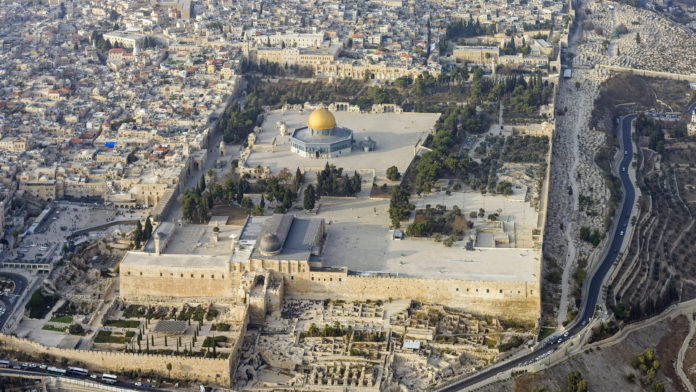
Palestinians must recognise Jerusalem
is Israel’s capital and
fundamental to peace, Israel Ambassador
Mark Regev told LBC
listeners on primetime radio on
Thursday.
Speaking on Nick Ferrari’s
show with Palestinian Emissary
Professor Manuel Hassassian in
a heated ‘Middle East’ debate,
Ambassador Regev also made
it clear Palestinians had broken
“core commitments” to peace,
however he would not “give up”
on a breakthrough.
“It’s something we can’t give
up, we owe it to ourselves and
children to try build a better
and peaceful Middle East,” he
explained.
Accepting the Oslo agreement
had not been a great success, he
referred to a letter dating back to
September 1993 from PLO leader
Yasser Arafat to Prime Minister
Yitzhak Rabin.
“From the Israeli perspective,
it’s all too clear why it did not
happen,” explained Ambassador
Regev.
“Arafat made two core commitments
to the Israel side.
“One, that the Palestinian side
totally rejects terrorism, they will
stop targeting innocent civilians,
and two, they commit themselves
to resolving outstanding issues
through peaceful negotiations.
“The Palestinians have clearly
broken their promises. They did
not keep these two core commitments
that Arafat made.”
Hassassian said it takes “two to
tango” in his response to the Israeli
Envoy.
Regev responded, “There was a
series of commitments made by
both sides.
“Israel was asked according to
Oslo to give land for peace, but
the sad fact is in the last 25 years
where Israel gave back land we
got the opposite of peace.
“And the most visible manifestation
of that is Gaza.
“Everyone said that’s the secret
for peace, redeploy behind the
‘67 lines, and did we receive
peace?
“I believe in peace and reconciliation,
but we have to deal with
the truth.
“Anyone who tells Israelis,
all you have to do is pull out,
everything will be fine, the Gaza
experience shows us that is not
true.”
Asked by a listener about the
effectiveness of Palestinian
leader Mahmoud Abbas, Hassassian
noted he was the only leader
to deliver the process, but US President
Donald Trump had put the
peace process back to “square one”.
Ambassador Regev was clear on
his viewpoint about the Palestinian
leader.
“We are willing to restart the
negotiations with him, with his
government anytime, anywhere,”
he noted.
“We don’t rule him out as a
partner. We’ve been very critical
of some of his policies, some of his
actions, which we see as counterproductive
to peace, but we don’t
rule him out at all.”
As for compromises for peace,
Ambassador Regev noted, “It’s
clear that on issues that are crucial
for Israel, we will have to compromise
on parts of our homeland.
“But when Israel pulled out of
the Gaza Strip, we didn’t get peace,
we got thousands of rockets on our
citizens. It has to be real peace.”
When it came to the historic decision
of President Trump moving
the US Embassy to Jerusalem,
there was clear disagreement.
“It was a good decision, he corrected
a historic injustice,” commented
Ambassador Regev.
He added, “There is a norm on
this planet that every country gets
to choose its capital city and other
people recognise and honour
that.
“Jerusalem has always been the
capital city of the Jewish people
and the modern State of modern
Israel since 1949.
“Recognising that is simply to
recognise reality and what is just.”
Emphasising the point further,
he noted, “There won’t be peace
without recognising Jerusalem
as Israel’s capital. This is a fundamental
element in any sort of
peace process.”
Hassassian retorted, “Jerusalem
is an occupied city and President
Trump does not have the right to
accept this fact.
“It is an act of defiance, there is
no international recognition.”
Further discussions took place
over US aid budget cuts, anti-
Semitism in Europe, payments
to terrorists and honouring martyrs,
and Gaza.
Ambassador Regev acknowledged
that British Jews had “concerns”
over anti-Semitism but
returning to a two-state solution,
he made the Israeli view clear.
“We accept the Palestinian
people have legitimate national
aspirations, but from the Israeli
perspective when someone says
a Palestinian State, if it looks like
Syria, Iraq or Iran, is that a solution?”
he explained.
“Does the Middle East need another
dysfunctional failed state.
“We’d like certain guarantees
that it will be a successful State
and not look like Gaza.
“That is not good for Israel, Palestinians,
for anyone who wants
to see peace in the Middle East.”









